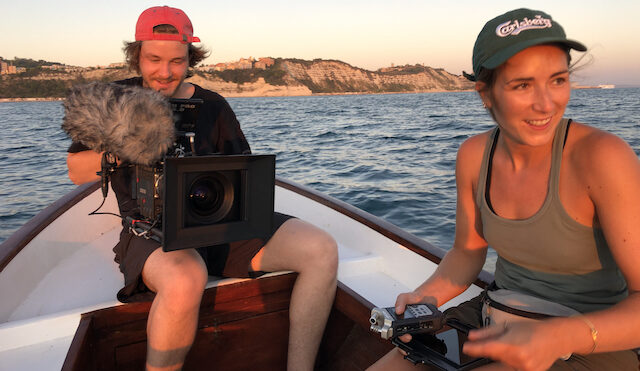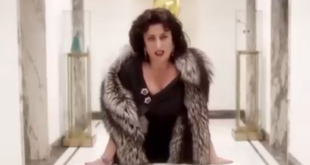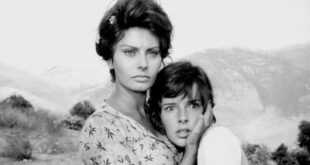It’s unusual for first-time filmmakers to be recognized by a high-profile international film festival but such is the case with Cecilia Pignocchi and Arthur Couvat. Their debut work, “Grottaroli,” is in the official lineup of the 2021 Tribeca Film Festival’s Shorts Program.
Set along the Adriatic Coast, the 14-minute film follows a group of veteran fishermen as they reflect on their vanishing way of life. Describing the fifth character as the sea, Pignocchi and her co-director offer total immersion into a culture that few outside the area knew existed.
I spoke with Pignocchi about the making of the short and her journey to premiering a first film on such a respected international platform.
Fra Noi: What inspired you and Arthur Couvat to tell the story of men in this fishing village?
Cecilia Pignocchi: Arthur and I were inspired by the strong relationship that these men have with the sea and we were curious about their way of living in this unique landscape. I grew up a five-minute walk from the marine caves that have been carved by generations of fishermen, locally known as the Grottaroli. I only realized how unique this place was when I moved away. Living far from the sea and from my culture allowed me to see my hometown in a different light. Every time I would return home, I would see the caves as a movie set. After doing some research and site visits with my father, I involved my longtime friend and cinematographer Arthur Couvat. I showed him pictures of the caves and their inhabitants and he immediately loved the idea of making a short about this place. From then on we started our journey of producing this short film together. It has been a true labor of love, the project has been completely self-funded by us, the directors, with very little budget.
FN: Tell me about Grottaroli.. Is it as its name suggests and made up of grottoes?
CP: Grottaroli are the people who carved the caves. The term comes from “grotta” which means “cave” in Italian. So literally Grottaroli means “Cave people”. These marine caves are the extraordinary result of the work of man guided by fishing needs. Along the coast of Ancona, many caves have been dug over the centuries by the farmers who lived on the upper part of the cliff. First carved to store boats and fishing tools, the caves later became a gathering place. Nowadays, the new generation of cave owners go to the caves only in summer.
FN: What can you tell me about the protagonists of the film?
CP: We wanted to portray the real Grottaroli, the old generation, the men who come here all year round, no matter what the weather conditions are. So we looked for our cast in the winter, the season during which most of the caves are closed. It was during those cold wintry days that we found our two last professional fishermen, and other passionate men who descend the steep paths everyday.
FN: The trailer is beautiful. The music and sound of the waves really stood out to me.
CP: We really wanted to use the beautiful Italian music from the ‘60s, which embraced perfectly the mood and story of our film. “Mare Incantato” by Fausto Papetti, which translates to “The Enchanted Sea,” was the perfect song to portray our 5th character: the sea. The sea is in fact the reason why the caves exist and it’s the thread that connects our four characters.
FN: What do you hope to accomplish by telling this story? Do you think it’s possible to save this fading culture?
CP: We wanted to create a portrait of a place that’s changing. We don’t think our film will save a fading culture, but hopefully it will generate positive discussions on how to best
preserve this anthropological, cultural and environmental heritage.
FN: Did you study filmmaking? Tell me about your path as a visual artist and filmmaker.. I’m also curious about your English because it’s great! Did you spend time living abroad?
CP: I didn’t study filmmaking, I studied design which gave me a broad spectrum of skills without focusing on just one expertise. I have always loved cinema and I have always been curious about the world around me. After high school, I remember I wanted to become a photojournalist and travel the world. Then I went to study design and started working as an art director. Over the years I have experimented with different media, but with this project, I realized how interested I am in film-making. In particular, documentary film-making is a
beautiful form of art to express your view on the world. Arthur and I had a wonderful experience collaborating together and we are already working on our next project.
Learning English was a long process that started in middle school. I have always been bad at it and I hated it so much. I believe in learning by doing, so when I was 17, I decided to spend one year in Australia to finally learn English. Then during my university studies in Italy, I spent a semester at a university in Bristol and 3 months in NYC for an internship. After I graduated, I moved to Amsterdam where I started working 6 years ago. Now I can finally speak English!!
FN: Which filmmakers have influenced you along the way?
CP: Arthur and I love Werner Herzog. He represents a huge inspiration for both of us. I also love the style of old Italian short documentaries, where it was very much a poetic representation of reality with usually a deep male voice narrating and the people filmed were never interviewed. The shorts by Vittorio de Seta, Cecilia Mangini and Luigi di Gianni all did this on a diverse range of topics. I love when reality is portrayed as poetry. I think poetry can be found everywhere all around us.
FN: Now having this first filmmaking experience under your belt, is there any part of the filmmaking process that you prefer?
CP: I have to say I loved every part of it. The research is very compelling because it allows you to learn so many new things. Preparing a treatment is also something I love to do because that’s when the idea starts taking some sort of shape. Shooting is probably the most beautiful part but also stressful, because there is not too much time to think. It’s definitely something you craft with experience, so I have a long way to go. I really like editing, being able to decide the rhythm and find the most interesting way to connect the pieces together, as well as thinking about what music can let the images say something hidden.
“Grottaroli” will be available to stream June 16 and 17.
To learn more, click here.
To watch the trailer, click here.
 Fra Noi Embrace Your Inner Italian
Fra Noi Embrace Your Inner Italian







